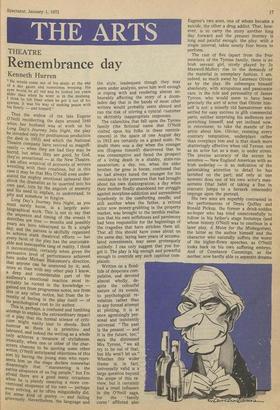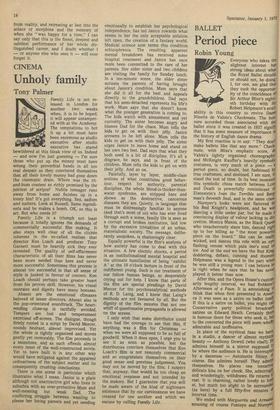THEATRE
Remembrance day
Kenneth Hurren
" He would come out of his study at the end of a day gaunt and sometimes weeping. His eyes would be all red and he looked ten years Older than when he went in in the morning. I think he felt freer when he got it out of his system. It was his way of making peace with his family — and himself."
Thus the widow of the late Eugene O'Neill recollecting the days around 1940 when her husband was at work on his Long Day's Journey info Night, the play he intended only for posthumous production (he died in 1953) and which the National Theatre company have revived so magnificently — when they are bad they may be horrid, but when they are good, by God, they're sensational — at the New Theatre. I am often sceptical of accounts of writers wrestling with their creations, but in this case it may be that Mrs O'Neill even understated the mighty emotional upheaval that shook the dramatist as he quarried into his own past, torn by the anguish of memory and his need to explain, to understand, to pity and somehow to forgive. Long Day's Journey Into Night, as you must surely know, is a largely autobiographical work. This is not to say that the sequence and timing of the events it describes are true — months and possibly years are here telescoped to fit a single day, and the pattern is skilfully organised to achieve stark theatrical effects — but every facet of the play has the unmistakeable and inescapable tang of reality. I think it inconceivable, certainly when given the persuasive level of performance achieved here under Michael Blakemore's direction, that anyone can be unmoved by it; and, more so than with any other play I know, a deep and considerable part of the audience's emotional reaction must inevitably be rooted in the knowledge — gained not from programme notes, nor from this or any other notice, but from the intensity of feeling in the play itself — of its psychological cost to its author. This is, perhaps, a confused and fumbling attempt to explain the extraordinary impact of a play that the formal science of criticism might easily tear to shreds. Such humour as there is is primitive and laboured, and indeed the writing as a whole only achieves a measure of stylishness, ironically, when one or other of the characters chances to be quoting some other writer. O'Neill anticipated objections of this sort by having the young man who represents him on the stage declare somewhat disarmingly that "stammering is the native eloquence of us fog people." but I'm afraid there are a good many occasions When he is plainly essaying a more conventional eloquence of his own — perhaps even striving, as he often misguidedly did, for some kind of poetry — and failing grievously. Nevertheless, the language and the style, inadequate though they may seem under analysis, serve him well enough in coping with and rendering almost un bearably affecting the story of a doomladen day that in the hands of most other writers would probably seem absurd and run the risk of stirring a cynical customer to skittishly inappropriate responses. The calamities that fall upon the Tyrone family (the fictional name that O'Neill visited upon his folks in these reminis cences) in the space of one August day in 1912 are certainly on a grand scale. No doubt there was a day when the younger son (Eugene himself) discovered that he was consumptive and faced the prospect of a living death in a shabby, state-run sanatorium; a day, too, when the elder brother, far gone in booze, confessed that he had always hated the younger for his resistance to the pressures that had brought about his own disintegration; a day when their mother finally abandoned her struggle against morphine-addiction and surrendered hopelessly to the comforting needle; and still another when the father, a retired actor now money-grubbing in the property market, was brought to the terrible realisation that his own selfishness and parsimony had been responsible for the beginnings of the tragedies that have stricken them all. That all this should have come about on the same day, laying bare years of accumulated resentments, may seem grotesquely unlikely. I can only suggest that you forget it. The play is big enough and powerful enough to override any such captious complaints. Written on a floodtide of desperate compulsion, and devoted almost wholly, despite the colourful nature of its events, to psychological revelation rather than to any formal attempt at plotting, it is at once agonisingly 'personal and insistently universal. "The past is the present — and it is the future, tpo," says the distressed Mrs Tyrone, "we all try to lie out of that, but life won't let us." Whether this wider theme is, in fact, universally valid is a large question beyond the scope of this review, but it certainly had a cruel influence in the O'Neill saga.
for the 'family curse' afflicted also Eugene's two sons, one of whom became a suicide, the other a drug addict. That, however, is to carry the story another long day forward and the present journey is long and painful enough: the play. with a single interval, takes nearly four hours to perform.
The cast of five (apart from the four members of the Tyrone family, there is an Irish servant girl, nicely played by Jo Maxwell-Muller) rise to the demands of the material in exemplary fashion. I am, indeed, as much awed by Laurence Olivier as by the play. He submerges himself absolutely, with scrupulous and passionate care, in the role and personality of James Tyrone, who would seem to have been precisely the sort of actor that Olivier himself is not: a miserly old barnstormer who settled for easy success in glib commercial parts, neither surprising his audiences nor stretching himself, and yet inclined now, in retirement, to take the mantle of the artist about him. Olivier, resisting every contrary temptation, underplays rather than overplays him and is that much more shatteringly effective when old Tyrone, not as an actor but as a man, is under stress. The precise accuracy of the accent he assumes — New England American with an Irish. underlay — is an indication of the painstaking attention to detail he has lavished on the part; and only at one moment does one of his own actor's mannerisms (that habit of taking a line in staccato jumps to a berserk crescendo) impinge upon the portrait.
His two sons are superbly contrasted in the performances of Denis Quilley and Ronald Pickup, the former a drink-sodden no-hoper who has tried unsuccessfully to follow in his father's stage footsteps (and whose history O'Neill was to continue in a later play, A Moon for the Misbegotten), the latter as the author himself and the character who naturally suffers the worst of the higher-flown speeches, as O'Neill looks back on his own suffering embryo. And of Constance Cummings, as the mother, now hardly able to separate dreams from reality, and retreating at last into the solace of morphine and the memory of when she "was happy for a time," I can say only that this is the finest, deepest and subtlest performance of her whole distinguished career, and I doubt whether I — or anyone else who sees it — will ever forget it.















































 Previous page
Previous page